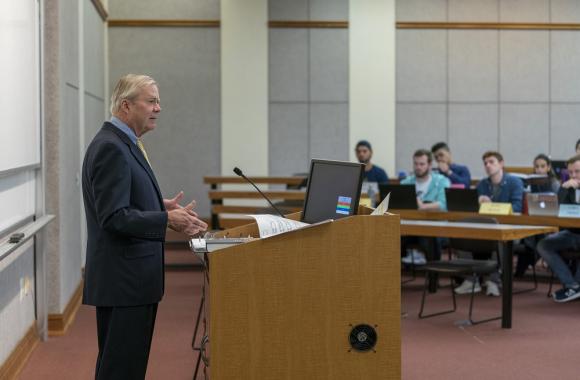
Professor Doug Eakeley, founder of the Center for Corporate Law and Governance, teaching a class in Newark.
The Rutgers Center for Corporate Law and Governance and Professors Matteo Gatti and Douglas Eakeley have embarked on a two-year research project with The Conference Board. The findings on the first project – involving an analysis of proxy voting data– were recently released.
The study is the largest research project to date undertaken by the Center, which was founded by Professor Eakeley and is co-directed by him and Professor Arthur Laby.
According to a news release prepared by The Conference Board:
“Working with FactSet and data mining firm IRGS Analytics, [The Conference Board and the Rutgers Center for Corporate Law and Governance] reviewed the analysis of more than 2,500 annual general meetings held at Russell 3000 corporations from 2015-2018. The findings showed that voting support on shareholder proposals regarding companies’ sustainability practices has been steadily rising over the last few years, though such proposals are still rarely approved.”
Professor Matteo Gatti
The study detailed data on shareholder proposals, management proposals, proxy contests, and other shareholder activism campaigns and noted issues that have taken center stage in recent proxy seasons – including the disclosure of corporate political contributions and lobbying activities, investigating the impact of climate change on the business, and the efforts to fill existing gender pay gaps.
Proposals related to social and environmental policies of corporations received, on average, the support of just 25.7 percent of votes cast at general meetings. “This finding indicates that shareholders of U.S. public companies continue to believe that the board of directors and senior management are better suited to determine the business viability of certain sustainability activities,” said Matteo Tonello, Managing Director of Corporate Leadership at The Conference Board. He added, “Our study also unveils a number of trends suggesting that the demand for additional disclosures in this area will continue to grow in the coming years.”
Though almost all of the proposals failed to receive a majority vote, there was an upward trend with respect to average support levels, the report found. Resolutions on political contribution disclosure and lobbying received 28 percent for votes in 2018, up from 24 percent in 2015; resolutions on human rights rose from 10.7 percent in 2017 to 17.5 percent in 2018. In addition, abstention rates dropped from 10.9 percent of votes cast in 2014 to 2.5 percent in 2018.
On the corporate governance front, Gatti noted, “In 2018, investors centered their attention on the right to call special meetings by shareholders, which was th top corporate governance-related resolution at Russell 3000 corporations, while majority voting and declassification barely made the list.”
The full Proxy Voting Analytics Report is included here.
The Rutgers Center for Corporate Law and Governance is an interdisciplinary forum for research, analysis, and discussion of current issues in corporate law and governance. The Center launched in 2015 and serves as a resource for students, faculty, alumni, and the business and nonprofit communities.
